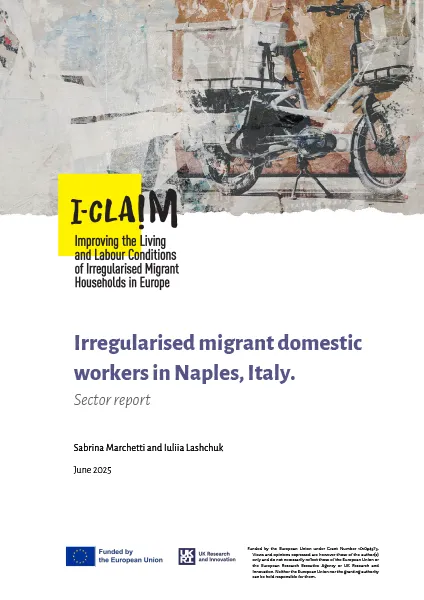Irregularised migrant domestic workers in Naples-Italy
Sabrina Marchetti and Iuliia Lashchuk
How to cite:
Marchetti, S., and Lashchuk, I. (2025) Irregularised migrant domestic workers in Naples, Italy. I-CLAIM. DOI: https://zenodo.org/records/15775615
Irregularised migrant domestic workers in Naples-Italy
Sabrina Marchetti and Iuliia Lashchuk
This report investigates the intersection of irregular migration, gender, and labour exploitation among women from the so-called former Eastern Bloc employed in Italy’s domestic and care sector. Drawing on indepth interviews with women from countries such as Ukraine, Poland, Georgia, Belarus, and Kyrgyzstan, the research explores how irregular status affects their working and living conditions, their ability to maintain family life, and their health and well-being. The decision to focus on this group of women is motivated by their significant presence in Italy’s care economy and the specific, yet often overlooked, vulnerabilities they face. Despite being perceived as “white” migrants, they occupy a marginalised position within Italy’s racialised and gendered labour hierarchies, often seen as inferior, replaceable, and compliant. Many arrived with tourist visas, under visa-free regimes, or through informal channels, finding themselves trapped in cycles of irregular work and dependency.
The report analyses how legal and policy changes – including Poland’s EU accession, the visa-free regime for Ukrainian and Georgian citizens, and the Temporary Protection Directive (TPD) – have shaped, but often failed to resolve, their precarious situation. While these measures have facilitated legal stay for some, they rarely translate into stable, formal employment, leaving women exposed to exploitation even when technically regularised. The report concludes that legal reforms alone are insufficient without structural changes in Italy’s labour market, welfare system, and migration governance. Addressing the persistent gap between formal legal status and lived reality is essential to ensure that Eastern European women working in Italy’s domestic and care sector can access rights, protection, and dignity.
